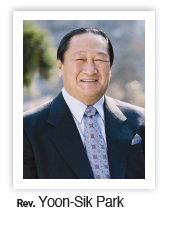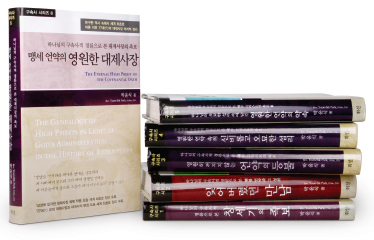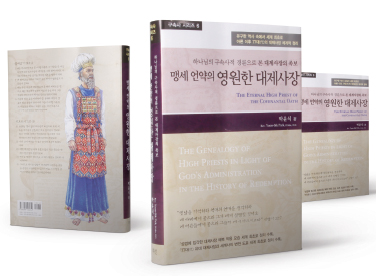「The Eternal High Priest of the Covenantal Oath」Author’s Foreword


The entire history of God’s work of creation, the subsequent Fall of mankind, redemption and finally the completion of the new heavens and the new earth are all part of God’s redemptive history. The core of redemptive history is Jesus Christ; and the 66 books of the scripture, from beginning to end, records God’s administration of redemption with Jesus Christ at its core. The history of the Bible including the Old Testament era of the Patriarchs, the era of Egypt and the Exodus, the 40-year wilderness journey, the era of the judges and the monarchy, the era of the Babylonian exile and return, the intertestamental era and the NewTestamen era are all part of God’s great history of redemption. Moses’ hortatory final words encouraged us to “Remember the days of old, [and] consider the years of all generations” (Deut 32:7). Therefore, we, too, must have a deep understanding of God’s redemptive history which is contained in the years of every successive generation starting from the very beginning.
After being banished from Eden, the channel through which mankind was able to meet with God was the redemptive movement of the altar sacrifice. This altar evolved from the individual altar of the patriarchal times to the tabernacle altar of the wilderness era. Then it continued through the altar of Solomon’s temple during the monarchical era and then the altar of the Zerubbabel temple in the post-exilic era. However, even though the daily sacrifice was offered on the altar repeatedly, the fundamental problem of sin was not resolved. At last, the One who had come as the culmination of the redemptive movement of the altar was Jesus Christ. He said, “For the Son of Man has come to seek and to save that which was lost” (Luke 19:10), and also, “it is not the will of your Father who is in heaven that one of these little ones perish” (Matt 18:14). As He proclaimed these words, Jesus did not rest for a moment but continued to carry out the movement of redemption (John 5:17). Finally, Jesus Christ, as the eternal high priest, achieved eternal atonement, at once, on the cross (Heb 7:27; 9:12, 26, 10:2, 10, 14, Ref ? Rom 6:10, 1 Pet 3:18). Through this achievement, He also fulfilled the promise of the “seed of the woman” and completed the redemptive movement to seek and to save all who were lost (Gen 3:15).
Jesus Christ, who gave His own body as a sacrifice, resurrected and ascended to heaven (Heb 4:14). And even now, He stands on the right hand of God’s throne as the high priest who supplicates, without rest, in order to find those who are lost (Rom 8:34; Heb 1:3; Col 3:1; 1 Pet 3:22; Heb 6:20; 8:1). Jesus is truly the only eternal high priest who came according to the order of Melchizedek (Heb. 2:17; 3:1; 4:14, 15; 5:5; 6:20; 7:11, 17; 9:11). He is the one and only high priest of the covenantal oath (Heb 7:20-21; Ps 110:4).
There are many high priests mentioned in the Bible. The ministry of the high priest reveals for us the image of Jesus who is the true high priest. Since the high priests were the ones who represented the people of Israel before God, their genealogy and history speaks on behalf of the genealogy and history of all Israel. But unfortunately, the genealogy and history of the high priests and the priests have been ignored by most people until now. Domestically and internationally, there have been a few scholars who have researched the subject. However, there has not been a study that has organized all 77 high priests from the time of Aaron until the destruction of Jerusalem in AD 70 in a diachronic (through time) and systematic way. Putting together the contents of this heretofore uncharted field of study was quite overwhelming for such a lowly person as myself. However, with my manuscripts from 45 years ago serving as the foundation for this work, I was enabled, entirely by the benevolent help of God, to put together the “genealogy of the high priest”; I am wholly grateful and moved at this.
As you carefully peruse through this treatise, it is my hope that this work will become a standard text in this field of study so that it will lighten the load of many scholars' efforts. Furthermore, it is also my hope that this work will open the gateway toward much more expansive and fruitful research thereby broadening the knowledge base of many believers. It is my desire that through this elderly servant's research, numerous world renowned masterpieces will be produced so as to make the Korean Church proud and also to astound the global theological world.
With the heart of a ginseng digger searching for centuries-old wild ginseng deep in the mountains, I poured my heart and soul, and focused my mind in hopes of digging up the mysteries of the administration of redemption (Eph 3:9) from the Holy scriptures. I carefully retraced the steps of our forefathers of faith which were hidden deep within the years of all generations (Deut 32:7). And there were many times when I could not hold back the tears as I noticed the unchanging love and grace that was at work within those generations. The more I write, the more I become aware of shortcomings in my ability to plan out and write the book. Moreover, I am sorry and regretful that due to such shortcomings, I was not able to fully express the administration of redemption within the years of all generations and the inspiration that God had provided. There was so much I wanted to say, but I could not put all of those words onto paper. But more importantly, I am sorry to God that I could not properly express the words of inspiration that was bursting forth so fervently in my heart. However, it is my earnest hope that our God, who perfects all things, will enable everyone who reads this book by faith to understand the hidden administration of mystery that had been at work through eternity (Col 1:26).
Nowadays, the Korean Church and its pastors have fallen into materialism and mammonism, and it is quite regrettable to see them being criticized for it. During Jesus’days, the Pharisees also loved money (Luke 16:14), and the scribes devoured widows’fortunes (Mark 12:40; Luke 20:47). However, Job, the utterly righteous man of the east, confessed, “I have not put my trust in gold or said to pure gold, ‘You are my security.’ I have not celebrated my great wealth or the riches my hands had gained” (Job 31:24-25; New Century Version). Human beings are mere sojourners who have nothing to call their own here on earth. We are just a vapor that's here a little while, then it's gone. We are here for a short moment, like a passing shadow that disappears without a trace (1 Chr 29;15; Jas 4:14; 1 Pet 2:11). But afterwards, there will certainly be the judgment of God (Rom 2;16; Heb 9:27; Rev 20:12-13). I did not realize this when I was young, but the more I age, the more the words, "conduct yourselves in fear during the time of your stay on earth," ring true in my heart.
All human beings are imperfect, frail and full of blemishes. It is certainly not our Lord's wish that we criticize and deride one another. We must respect one another and go forth together toward a better conclusion. Romans 14:10 states, "But you, why do you judge your brother? Or you again, why do you regard your brother with contempt? For we will all stand before the judgment seat of God." If one were to rashly judge and condemn another based solely on hearsay and rumors, and when those turn out to be untrue, then the one doing the condemning will be greatly humiliated before our Lord. We must inscribe the words of Matthew 12:36-37 deep within our hearts: "every careless word that people speak, they shall give an accounting for it in the day of judgment. For by your words you will be justified, and by your words you will be condemned.” Christians who have been redeemed through the precious blood of Jesus must regard others more important than themselves (Phil 2:3) and must absolutely refrain from denouncing one another (Rom 2:1).
Before recklessly jumping into judging and condemning others, we must delve deeper into the Bible so that we can daily live uprightly in accordance with the righteous Word of God. Since the Word of God is upright (Ps 19:8; 33:4), the righteous will walk in them, but the transgressors will stumble in them (Hos 14:9). It is my earnest hope and desire that our God, who withholds no good thing from those who walk uprightly (Ps 84:11), will enable all who live upright lives to understand the amazing administration of redemptive history. Finally, I would like to extend my sincere gratitude to all who have supported this effort materially as well as spiritually until this precious book was able to be published. I would especially like to give my wholehearted thanks to all who have worked so hard to translate the History of Redemption series into various languages such as English, Japanese, Chinese, Indonesian, Spanish, Russian, German, Cambodian, Urdu and Hebrew.
My life, which had been saved?without cost?through the blood of Christ, is drawing near to its close. If I had just one wish, it would be that I can truly glorify God through the History of Redemption series. As the Apostle Paul’s great confession of faith states, whether I live or die, it is my deep desire that every cell in my body would overflow with the blessed fragrance of exalting only Jesus Christ (Phil 1:20).
Now, as the Korean Church returns exclusively to the Word of God, we will be greatly blessed as Joseph’s fruitful branch running over the wall (Gen 49:22). I earnestly hope that the History of Redemption series will become a channel through which the Word of God will be fully preached, not only in Korea, but throughout the world (Rom 15:19; Isa 11:9; Hab 2:14). It is also my deep desire that the books will become the fragrance that leads to life in Christ so as to save all nations of the world (2 Cor 2:15-16), and that the books will be greatly used as a tool that brings salvation to the ends of the earth.
